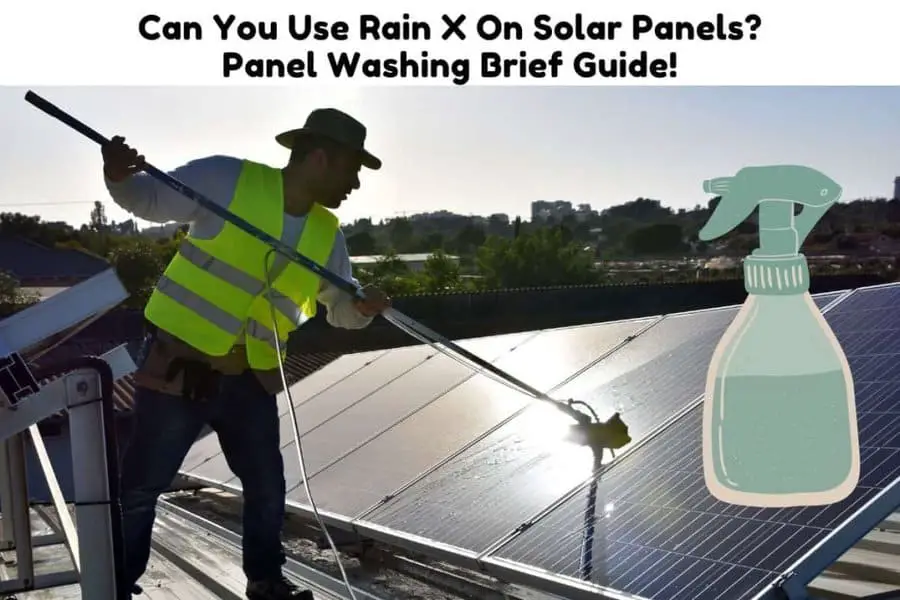ITW Global Brands is a company that specializes in automotive care products. Rain X is one of many products in their portfolio which is a hydrophobic coating or water repellent used to disperse water and the company discourages the use of Rain X on solar panels. This is likely to be due to legal considerations, lack of any evidence that it works on solar panels or it could be the product has adverse effects when applied to solar panels.
Generally, if a manufacturer explicitly states that its product should not be used in a certain way, you might want to follow those guidelines. But there are many instances in which products are used outside of their intended purposes with good results or at least without any bad consequences.
For example, did you know mouthwash was originally used as a floor cleaner and bubble wrap was first used as wallpaper?
Many products start as one thing and end up being used for something else. Could this be the case with Rain X? Let’s dig a little deeper to find out. But firstly, let’s look at what Rain X is used for.
On a side note! If you’re in need of a reliable and high-performance portable solar panel, We strongly recommend the Jackery SolarSaga 100W Portable Solar Panel (Amazon Link).
With a high conversion efficiency and foldable design, this solar panel is easy to transport and set up, making it perfect for outdoor activities like camping, hiking, and RV trips.

The US solar cell technology used in this panel ensures that you get the most efficient and reliable solar charging possible.
There is also a 60W option that is more affordable (Amazon Link)

What Is Rain X?
Rain-X is a hydrophobic coating or water repellent used to disperse water, sleet, or snow from car windows. Originally made for aviation windshields it has found wider use on automotive windshields.
Rather than stick to your window, Rain-X makes your windows water resistant, filling the pores in your windshield to create a slick surface that water slides off. While it can work wonders when driving in the rain can it be used on solar panels?
Pros of using Rain-X On Solar Panels
There are several reasons why you might want to use Rain-X on your solar panels. The primary reason would be to keep snow from collecting on your solar panels. Snow can shade your solar panels which means they will not produce energy. A snowy winter day can drastically reduce your solar output. Also find out “Will Ring Solar Panel Work In Shade? Where You Should Place It!“
Naturally, if snow can reduce your output through shading, you would want to remove it from your solar panels. If Rain-X can work on your windshield, why can’t it work for your solar panels?
Aside, from the manufacturer’s warning why shouldn’t you use it, this is one reason you might want to consider
Cons of using Rain-X On Solar Panels
Alcohol is the active ingredient in Rain-X. A solar panel is made with between 4-10% plastic. Some solar panels, especially flexible solar panels, are made mostly from plastic. Alcohol can damage or destroy plastic. Source
Using Rain-X on your solar panels could damage the plastic and your solar panels in the process. There are also no tests that show what effect using a hydrophobic coating such as Rain-X has on the light absorption of a solar panel.
What Is The Best Thing To Wash Solar Panels With?
Rain is the simplest way to wash solar panels. This is especially so for rooftop solar panels that are harder to access than ground-mounted solar panels. But there are instances where rainwater may be insufficient and the use of soap water is necessary. A yearly or six-month inspection should be done to check for dirt that cannot wash off with rainwater only.
The most common problem with dirt on solar panels is a bird or animal droppings. This is far more stubborn than dust and will not wash off in the rain. It’s in cases like this where you will need to use soap and water. This is how you would do it:
- Always wash solar panels in the early morning or late afternoon or when it’s cool. Washing solar panels when they are hot can crack the glass cover.
- Use light soapy warm water. Be careful of using hard detergents or heavy soaps.
- Use a light cloth or sponge. Avoid using a hard brush.
Does Rainwater Affect Solar Panels?
Rainwater does not harm solar panels. Before reaching the open market, solar panels are tested and certified by the International Electromechanical Commission (IEC). In terms of IEC certification, solar panels have to be able to withstand, hail, moisture, and extreme temperatures before they are passed through.
Solar panels have a glass mirror-like surface. When it rains most of the rainwater will slide off the solar panel. This is why it’s important to have solar panels tilted at an angle. If solar panels are installed without tilting rainwater will pool on the solar panel instead of sliding off.
Will solar panels work in the rain?
Solar panels produce energy from light. The less light there is the less energy they will produce. This is why we do not yet have solar panels that work at night and why they produce less energy on rainy days. There is not enough light for them to work with.
On cloudy days, solar panels produce between 30-50% of what they would normally produce. On a rainy day, the output will drop to less than 10%. Source
While rain will reduce how much energy solar panels will produce, rain is not necessarily a bad thing. As it turns out rain is a good thing.
How Do You Waterproof A Solar Panel?
Solar panels are designed to be water-resistant. Solar panels are sealed between glass and a metal back sheet using sealant glue to prevent water from entering and causing moisture damage.
There is no need to take further action to make a solar panel waterproof as solar panels come watertight as they are. You can, however, carry out periodic checks to ensure the seals remain intact once or twice a year when you clean the solar panels.
Moisture damage is typically the result of a defective solar panel. In this case, the solar panel can be returned for a replacement. Solar panels have a product workmanship warranty of between 12-25 years depending on the manufacturer. Source
How Do You Protect Solar Panels From Dust?
The most effective protection against dust is to wash the solar panels once every six months. Soap water or just water can be used. Dust can reduce the efficiency of a solar panel by up to 85%, and cleaning is the best way to improve their performance.

